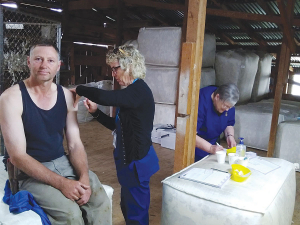NZ Red Meat Outlook 2026: Growth amid trade uncertainty
While things are looking positive for the red meat sector in 2026, volatility in global trade remains a concern, says the Meat Industry Association (MIA).
 Covid-19 vaccinator Leanne Allnutt administers a jab to Roddy Brown of Blue Mountain Station on a recent visit to the Mackenzie County station by a team from the South Canterbury DHB last month.
Covid-19 vaccinator Leanne Allnutt administers a jab to Roddy Brown of Blue Mountain Station on a recent visit to the Mackenzie County station by a team from the South Canterbury DHB last month.
Mandatory vaccination against Covid-19 for meat sector workers is still up in the air.
Meat companies support the Government's plans for a clear and simplified risk assessment process to help them decide whether or not they wish to make vaccinations mandatory at their plants.
However, Meat Industry Association chief executive Sirma Karapeeva told Rural News that mandatory vaccinations are "just one tool in the tool box".
"Our industry is operating under strict protocols to ensure the sector's continuing operations do not compromise people's safety or contribute to the spread of Covid-19."
A major issue facing meat companies is how to handle mandatory vaccinations for Maori and Pacific Islanders, two groups lagging behind in vaccinations.
Karapeeva wouldn't say how many meat processor staff are fully vaccinated.
"While employee vaccination information is private, our meat processing and exporting companies have indicated that staff vaccination rates are broadly in line with uptake rates in their regions, although this will vary from plant to plant and region to region," she says.
"Our companies are working hard to ensure as many of our people are vaccinated against Covid-19. This includes offering on-site vaccinations and various incentives.
"Māori and Pasifika make up a significant proportion of our workforce and we recognise these groups in particular are lagging behind others in getting vaccinated.
"Some processing companies have partnered with Māori health providers to promote clinics as a way to lift vaccination rates."
Currently, meat companies can make Covid-19 vaccination a health and safety requirement at plants, but this is a difficult and complex process and requires companies to undertake an assessment of the different risks of vaccinated people versus unvaccinated people, notes Karapeeva.
"It is critical that all workers are vaccinated to provide a shield against Covid-19, especially for meat processing where workers are working close together for long shifts.
"We applaud the Government for taking this step."
Last week, Workplace Relations and Safety Minister Michael Wood agreed to provide businesses not covered by vaccine certificates greater clarity on whether they can mandate vaccines.
Wood says this process will provide businesses with a clear and simplified legal framework to make decisions about requiring staff to be vaccinated or not.
The risk assessment will build on the guidance provided by WorkSafe, with input from public health officials, business representatives and unions.
Rapid Test Support
Meat processors support the roll-out of rapid antigen tests in New Zealand.
MIA chief executive Sirma Karapeeva says being able to test a proportion of workers every day will provide an extra layer of protection for the workforce.
It would also ensure that if a worker is infected, the spread of the infection can be much more rapidly identified and controlled.
"We welcome the Government's recognition that having a fully vaccinated workforce can support continued access to our global markets and we look forward to the details on how this will be applied," she says.
Tickets are now available for Beef + Lamb New Zealand’s (B+LNZ) Out the Gate, returning from 19-21 May 2026 at Te Pae, Christchurch.
Dairy Women's Network (DWN) is welcoming AgriHealth as a new partner.
Northland Field Days patron Ross Newlove remembers the inaugural field days he attended 40 years ago.
Southland farmer Murray Donald has been appointed as chair of Safer Farms, the industry-led organisation focused on reducing harm, injuries and fatalities in the agricultural sector.
National Lamb Day returns this Sunday, 15 February, with Beef + Lamb New Zealand Inc calling on Kiwis to fire up their barbecues and celebrate the people and the product that put New Zealand on the world map.
When it comes to arranging the sound system at Northland Field Days, no one does it better than Colin Finlayson.